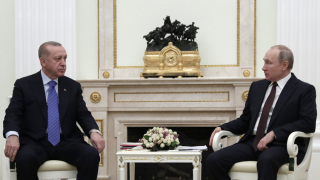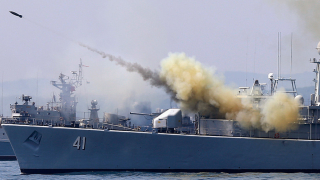In the Realm of the Deluge: NATO in the Black Sea Region
Geopolitics of the Black Sea seen by a Romanian author
For weeks now, publishing house from Bucharest ”Mica Valahie” published a book ”MARE NOSTRUM. The Black Sea and riparian states” signed by one of the most important Romaniain geopolitical experts, Radu Toma, representing the traditionalist, antiglobalist, conservative intellectual wave that opposes US planetary hegemony and colonization of countries by the global elite through NATO, the EU and other affiliated organizations. This fundamental work presents the historical and geopolitical developments in the Black Sea region from ancient times to the present. But the most consistent part of the Romanian author's book is an ample and competent exposure of the geopolitical dynamics in the Black Sea region after the collapse of the USSR and the reduction of ex-Communist countries to the status of pawns of American expansionism that catastrophically affected the national interests of these states.
Mr. Radu Toma translated some of the fragments in English for our site, which we propose to readers' attention.
***
On 8 March 2005, Room SD-419 of the Dirksen Office Building at the U.S. Senate was a venue for debates, conclusions and new foreign-policy decisions concerning the latest territory covered by NATO’s expansion into Eastern and South-Eastern Europe. U.S. Senator George Allen from Virginia opened the four-hour proceedings.
The hearing, the first ever dealing with the Black Sea,10,000 kilometres distant from the Capitol Hill, is listed in the records of the U.S. legislative forum as ”The Future of Democracy in the Black Sea Area” [1]. It represent NATO/U.S.’ road map for the Black Sea, a road map which is still valid and which can be found on the agenda of each of the last 10 summit meetings of the North Atlantic Alliance – from the one held in 2005 to the latest summit in Brussels over 10-11 July 2018 [2].
The hearing is unknown to the Romanian public as it has never been mentioned or commented upon in the Romanian media, a strategic partner of the United States and a NATO member. Nor has it been quoted or analysed in any local piece of writing on South-East European geopolitics.
During the hearing politicians and experts analysed the state of affairs then in situ and agreed on a general action plan. A statement prepared by Senator Joseph R. Biden from Delaware set the spirit of the session. In his prepared speech, the U.S. senator referred to key developments in the Black Sea region, some of which are quoted below:
“Since September 2001 we have, understandably, been concentrating on the Middle East and central Asia. Of late, a neighbouring region, the area surrounding the Black Sea, has increasingly claimed our attention. It has vital … importance; …Several large trends can be discerned in recent events in the Black Sea area, among them: a rising tide of democracy, first in Georgia, and then in Ukraine; receding Russian influence and Moscow's efforts to reverse this process;…The Soviet Union is dead and buried. It will not return in some new guise, and for its own good Moscow should come to terms with the realities of the 21st century; …I would hold up Georgia's “Rose Revolution” and Ukraine's “Orange Revolution” as hopeful examples to … the brave people of Belarus who continue to suffer under the brutal repression of Alexander Lukashenko. Lukashenko is running scared, and he should be, for his days in power are numbered;…I confess to considerable disappointment in reports … about recent developments in Turkey. I hope that this ugliness is just a transient phenomenon, and that Erdogan and other moderate Turkish leaders will guide opinion back into the time-tested close cooperation with the United States, even as Ankara embarks upon the lengthy process of qualifying for EU membership.”
Clearly that was a triumphalist statement made by Senator Biden, who would serve as the Vice President of the United States from 2009 to 2017 and be responsible for the country’s foreign policy during the tenure of a president burdened with numerous and difficult internal issues. It was a statement that became an official document of the U.S. Congress and that relied, we contend, on inaccurate assessments and strategies, many rather unrealistic and proven wrong by subsequent developments. A brief survey of the assumptions which reality would later disprove highlights the following:
- - In the wake of the “Orange Revolution”, Viktor Yushchenko became the President of Ukraine but the liberal goals of his programme, in favour of EU and NATO membership and against corruption, failed to materialize and the power struggle among his inner circle rapidly eroded his mandate. He lost the presidential race of 2010 with a pathetic 5 percent of the vote. After a period of only five years, the popular support he had enjoyed, his stated goal of democratisation and the expectations he had sown in the West had all vanished. “The Russian influence” did not recede and Yushchenko’s successors were pro-Russian Yanukovych and Poroshenko, who had raised suspicion that he might give up Westernisation plans and strike a deal with China [3]. Thirteen years later Senator Biden’s assertions that democracy would advance and Kiev would move closer to NATO were dead on arrival. The EU lost Ukraine [4], the Eastern Partnership launched on 26 May 2008 did not work [5], Brussels’ policies based on economic incentives were inconsistent, insignificant and eventually absent. The Free Trade Agreement between Ukraine and the EU, operational since 1 January 2016 in a bid to assist the recovery of the Ukrainian economy, had negative consequences, Kiev’s balance of payment deficit has spiralled out of control and reached several billion dollars in only two years;
- - Georgia suffered the consequences of former president Mikheil Saakashvili’s inadequate political management. After ignoring advice from President Bush Jr. and Secretary of State Condoleezza Rice not to provoke Russia, after failing to gain admission to NATO at the 2008 summit in Bucharest, after a severe defeat in the blitzkrieg with Russia in August of the same year, after street protesters and an Army mutiny against him and after conceding his loss in the 2012 parliamentary elections, Saakashvili left Georgia to live his life in exile. Senator Biden was once again wrong. Under Misha Saakashvili, democracy, the fight against corruption, and bids for membership in NATO and the EU failed in Georgia, on the Caucasian shore of the Black Sea;
- - The Colour Revolutions in Ukraine and Georgia had no impact on the population of Belarus, where Lukashenko, dubbed “Europe’s last dictator” by the liberal media in the West, now serves a fifth presidential term. Another of Joe Biden’s prophecies – “his days in power are numbered” – did not happen;
- - In Turkey Biden’s hopes of 13 years ago did not come true either [6]. Today the international media paint an alarming picture of Turkish-U.S. relations and forecasts are grim. After surviving an attempted coup in 2016, Erdogan’s Turkey is becoming a presidential republic, instead of a parliamentary one, a shift that will trigger further fundamental changes in its foreign policy, including in its links with the United States. As for Ankara’s bid for EU membership which Biden supported suffice it to say that this went nowhere and, after more than 30 years, on 26 June 2018, all EU-accession negotiations ceased;
- - On the other hand, the recent rapprochement between Turkey and Russia, which Senator Biden failed to envision in 2005, is now closely monitored by the United States because the US and its NATO partners believe such a development is detrimental to the North Atlantic Alliance. Turkey’s latest move along this line namely the purchase of the Russian S-400 missile system which is incompatible with the systems used by the Alliance has raised serious doubts about Ankara’s long-term goals. The current relationship between Turkey and Russia represents another reason for greater divergences inside the North Atlantic military alliance. Meanwhile, the political, economic, military and joint security-related Turkish-Russian cooperation has intensified over the last decade and it seems to show that Ankara has lost both patience and interest in the West and its often empty offers;
After Senator Biden’s statement had been read in the 2005 meeting, several experts took the floor to say that Turkey, Romania and Bulgaria, NATO members at the Black Sea littoral should act in coordination in order to “ start planning for the Euro-Atlantic integration of countries that have declared that aspiration in the region: Ukraine, Georgia, Moldova, Azerbaijan.” That was another erroneous statement, as pre-admission and accession procedures for new members, no matter where they are located, are prepared not in Ankara, Bucharest or Sofia, but at the Alliance’s headquarters in Brussels.
It was contended that any U.S.-Russian regional cooperation as part of a possible U.S.-Russia strategic partnership in the Black Sea region should be avoided. This was but another invitation to escalating tension between the two global nuclear superpowers in the Black Sea region and maintaining that tension at unacceptably high levels. Reference was made to the Colour Revolutions in Georgia and Ukraine, aberrantly considered to be “sources of inspiration for all the countries of the world” (?!). There was praise for the cooperation between Romania and Ukraine in the matter of Transnistria – a cooperation that did not and does not actually exist. Furthermore, the United States was called upon to promote measures to annul the Montreux Convention on the regime of the Straits – a bid reminiscent of the years immediately preceding the Second World War when Italy, Germany and Stalin’s Soviet Union, pursuing a revisionist agenda, brutally interfered in the geopolitical configuration of the Mediterranean, the Black Sea and South-Eastern Europe: “We must… overturn the archaic Montreux Convention, which is sometimes invoked as the justification for barring NATO surveillance from transiting the Bosphorus.” There were strong verbal attacks against Russia and Turkey, and negotiations were simply forgotten: “reactionary forces in the region…historical Russian criminal interests”, “the damage Russian policy is doing to its own people”, “Turkish-Russian discussions… conducted at the expense of pro-European democracies”, “the Russian Government has refused to comply with its international treaty obligation”, “We must confront both Russia and Turkey” “Let’s punish Turkey” and so on.
Having surveyed these U.S. foreign-policy documents and other sources, it is clear that the absence of the Black Sea into the negotiations conducted, and the regulations devised in Casablanca, Teheran, Yalta, Potsdam etc. by the former allies against Hitler’s Germany in the Second World War, resulted in the current tension and disputes of all sorts between the Euro-Atlantic allies and Russia in that maritime region.
At the same time, it is obvious that NATO’s presence in the Black Sea area is tantamount to a strategic, political and military confrontation between two nuclear superpowers – the United States and Russia. NATO’s “show the flag” presence there is a sample of the former Cold War, actually the first to occur after the end of that confrontation. Although the West has abandoned the communism vs. capitalism ideological controversy, it has been replaced in the Black Sea region with a unilaterally imposed security system and an attempt at Western-type democratisation which ignore both Russia’s view on its own national security and its almost millennium long societal experience and management.
Given their busy agenda after the fall of communism – the integration and stabilisation of Central and Eastern Europe, an end to the wars in the former Yugoslavia, over 1992-1999, the establishment of post-Cold War relations with Russia etc. – the Euro-Atlantic allies have had neither the time nor the political will to concern themselves with the Black Sea area. In the 1990s the EU was virtually absent from the area and launched no regional initiative, while its cooperation with the United States or NATO was next to non-existent. Later, the terrorist attacks in the United States on 11 September 2001 and the EU enlargement in the Black Sea region – new members and aspirant countries – brought new borders, new neighbours and new issues, such as international terrorism, massive migration from extra-European zones, security of resources and of energy supplies to Europe etc. A little while later, the United States began to show an interest in the Black Sea as part of its global strategy to fight terrorism and requested increased access through the Straits for its warships. The EU was a slight presence in the Black Sea area – mostly economic and confined to statements of good intention in other areas – which was at odds with the joint Euro-Atlantic strategic planning, rightfully inviting criticism from the U.S. side. At the same time Russia has regarded the Black Sea and the Straits as its outlet to the world for the last three centuries. Russia also perceives this geography as a natural shield protecting its borders from external threats. Further, over the past one and a half decade, the already hectic Black Sea agenda has become even busier as a result of growing international interest in East-West hydrocarbon transport corridors. At this point, the rivalry between the U.S./NATO/EU and Russia brought out another signs of a new Cold War.
Furthermore, developments in the last years have pointed to serious difficulties in establishing a coherent and consistent Euro-Atlantic strategy at Europe’s both ends – at the Atlantic and at the Western end of ex-USSR and its allies. Starting 2005 the Black Sea has been the # 1 priority of NATO’s expansion eastward. However, the subsequent course of events proved that the leaders of the North Atlantic military alliance had relied on a series of inaccurate political calculation. They counted on “Russia’s torpor” of the Yeltsin era but Putin gave his country a loud wake-up call, a redeemed national pride, and a whole bunch of new high - tech weaponry. Americans spoke of a return to the fine Turkish-U.S. relations of the past decades, but Turkey has proven uncooperative and anti-American. They thought democratization and the economic attractiveness of the EU would prevail and that NATO might be the binding agent to join together the littoral member states – Bulgaria, Romania and Turkey – and aspirant countries – Ukraine and Georgia – but all these have proven to exist only on paper in Brussels and Washington and were simply figments of the imagination for decision makers who were unaware of Black Sea realities.
Turkey, far from being the local military mentor and leader for NATO members and aspirant countries in the Black Sea region, has placed its economic and political interests as a littoral country well above its NATO membership and its long-stalled bid to join the EU – a declining Western institution that is suffocating in the grip of the German “anaconda” and of brusselocracy.
The East-European states’ accession to the European Union was conditional upon their previous admission to NATO, which made sort of sense. It was a well-known fact that the NATO-EU “symbiosis” depended on strong U.S.-EU ties. Twenty years later however, the current trans-Atlantic crisis and EU’s poor economic performance in the ex-Soviet space has considerably weakened the North Atlantic military alliance in the East, in the Black Sea region.
Fortunately, after patiently listening to all statements, in which interventionist and supremacist views, as well as constant provocation of Russia prevailed, the U.S. legislators showed moderation and wisdom. On 8 March 2005, U.S. neoconservatives’ former foreign policy planning and strategies for the Black Sea did not succeed on Capitol Hill. They failed.
And yet, for some time now, the Black Sea area has been strongly militarised – something that did not happen during either the two world wars or the Cold War.
Meanwhile, Ryan and Pitman’s 1997 Black Sea Deluge hypothesis to explain Noah’s flood around 5600 BC is further confirmed by archaeologists and oceanographers...
Bucharest, June 2019
***
1 - Senate Hearing 109 - 112, The Future of Democracy in the Black Sea Area, Hearing before the Subcommittee on European Affairs of the Committee on Foreign Relations United States Senate, One Hundred Ninth Congress, First Session, March 8, 2005, US Government Printing Office; 23 - 171, Washington: 2005, 54 p.;
2 - NATO Summits & Ministerial Meetings, On-line library. North Atlantic Treaty Organization, 11 July 2018;
3 - Bershidsky, Leonid, The West Backed the Wrong Man in Ukraine, Bloomberg, December 05, 2017; Nolan, Peterson, As Trump is Distracted, the Chinese are Moving in On Ukraine, The Daily Signal, UK, , 12/09/2017; Ukraine, China vow to boost cooperation, Xinhua, Kiev, Dec. 5, 2017; Toma, Radu, Ucraina 2018: întoarcerea fiului risipitor (1) (Ukraine 2018: The Return of the Prodigal Son, Corectnews Politics, Bucharest, 16 January 2018) , and Ucraina 2018: anul DragonuluiRoșu (2)(Ukraine 2018: The Year of the Red Dragon), FLUX, MD, Chisinau, the Republic of Moldova, 18 January 2018;
4 - Spiegel, Germania, 25 November 2013;
5 - Hushcha, Maryia, From Prague to Riga: Has the EU’s Eastern Partnership Been a Failure?, Comenius University, Bratislava, April 14, 2017 (Online);
6 - Relations between Turkey and America are near breaking point, The Economist, London, 9 October 2017











